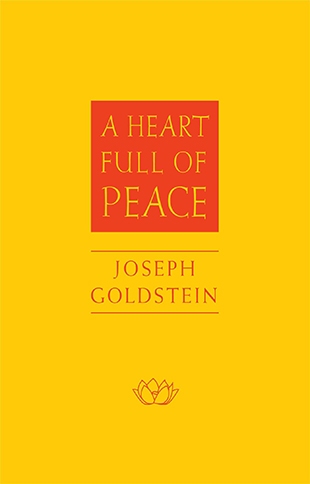Joseph Goldstein is a cofounder of the Insight Meditation Society in Barre, Massachusetts, where he is one of the resident guiding teachers. He lectures and leads retreats around the world. In this short but substantive volume, Goldstein presents his thoughts on the practice of compassion, love, kindness, restraint, a skillful mind, and a peaceful heart as an antidote to the materialism of our age. These teachings were given as part of Harvard Divinity School's Wit Lectures on Living a Spiritual Life in the Contemporary Age.
The powerful practice of loving-kindness creates a lightness of being in our lives. It enables us to move beyond feelings of unworthiness and become more understanding of ourselves. It enables us to open our hearts to others. As an example, Goldstein offers this opening the heart exercise:
"As an experiment, the next time you are doing an errand, stuck in traffic, or standing on line at the supermarket, instead of being preoccupied with where you're going or what needs to be done, take a moment to simply send loving wishes to those around you. Often, there is an immediate and remarkable shift inside us as we feel more connected and more present."
Loving-kindness can also be extended to our enemies. He quotes the Dalai Lama: "Your enemies may disagree with you, may be harming you, but in another aspect, they are still human beings like you. They also have the right not to suffer and find happiness."
Anyone who lives in a city will appreciate Goldstein's story of being on a meditation retreat in India when the Delhi Girls, a paramilitary Girl Scout troop, camped nearby with loudspeakers blaring Hindi music from six in the morning to ten at night. He had to let go of his idea of self-importance and just let things be. We have experienced the same irritation with noise pollution in New York City and now have an insightful quotation from Thai meditation master Ajahn Chah to use when it comes: "If my mind doesn't go out to disturb the noise, the noise won't disturb me." Helpful advice and true.
In the final chapter in A Heart Full of Peace, Goldstein discusses freedom and the Buddhist practice of training in morality or non-harming. This requires "developing a greater sensitivity to those around us, and taking care with the effect our actions might have." The first step is to establish a regular, daily meditation practice. The second is developing concentration and mindful awareness. The third is cultivating wisdom. Goldstein makes this observation about the importance of practice:
"Pablo Casals, the world renowned cellist, still practiced three hours a day when he was ninety-three. When asked why he still practiced at that age, he said, 'I'm beginning to see some improvement.' The training in meditation will only happen through your own effort. No one can do it for you. There are many techniques and traditions, and you can find the one most suitable for you. But regularity of practice is what effects a transformation. If we do it, it begins to happen; if we don't do it, we continue acting out the various patterns of our conditioning."
`